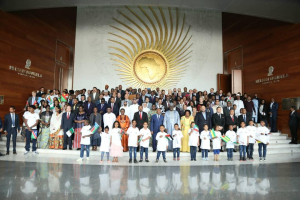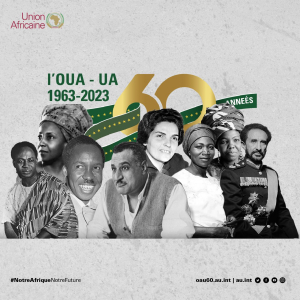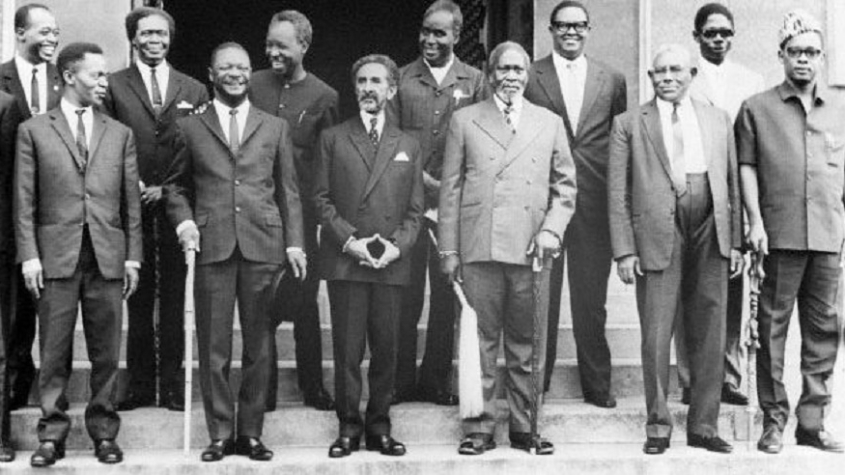When Africa celebrated diamond jubilee of Organization of African Unity (OAU)
The now-defunct Organization of African Unity (OAU), which was relaunched as the African Union (AU) in 2002, was created by a charter signed by 32 heads of independent African states on May 25, 1963, in Addis Ababa, Ethiopia.

While Article I of the Charter says the OAU shall include continental African states, Madagascar and other islands surrounding Africa, its Article II outlines its purposes as promoting the unity and solidarity of African states; coordinating and intensifying their cooperation and efforts to achieve a better life for the peoples of Africa; as well as defending their sovereignty, territorial integrity and independence and eradicating all forms of colonialism from Africa.
The formation of the OAU was a culmination of far-reaching currents of Pan-Africanism that began in the African Diaspora in the mid-19th century, followed by a wave of decolonization in Africa in the 1950s, a combination of which gave birth to Pan-African movements campaigning for the self-determination of people of African ancestry based in the United States of America and Europe, on the one hand; liberation of African countries from the clutches of European colonialism, on the other hand.
Notable pioneers of Pan-Africanism in the Diaspora were descendants of enslaved Africans such as Martin Delany, Alexander Crummel, W.E.B. Du Bois and Marcus Garvey. Within Africa, the vanguards of Pan-Africanism and African unity were leaders of newly independent states such as Kwame Nkrumah of Ghana, Gamal Abdel Nasser of Egypt, Julius Nyerere of Tanzania, Sékou Touré of Guinea and Kenneth Kaunda of Zambia.
The independence of many African colonies in the early 1960s gave rise to campaigns for a United States of Africa, whose major proponents were Nkrumah, Touré and Keita. Yet, divergent ideologies led to a division among the post-independence African leaders, giving rise to two main ideological blocs, namely the Casablanca Group “progressives”, which promoted a politically united federation of African states and the Monrovia Group “gradualists”, which favoured a looser alliance based on gradual economic cooperation.
Therefore, the OAU was a compromise institution. The same ideological differences that birthed the OAU as a “watered-down” version of what its founders wanted it to be, as well as the Cold War which saw African countries torn between the East and West ideological divides, hindered its ability to fulfill its mandate. As the 1960s gave way for the 1970s, most of the frontline founders of the OAU such as Nkrumah, Selassie, Nasser and Keita were no longer in office due to a combination of coup d’états and natural deaths.
One of the OAU’s notable achievements was successfully ending colonialism in Africa, whose climax was the end of apartheid in South Africa in 1994. Other achievements include the development of Regional Economic Communities (RECs) and the conceptualization of the African Economic Community (AEC) in 1991. Analysts argue the OAU Charter which made decolonization its raison d’être constrained it from addressing Africa’s intractable conflicts and fostering economic integration.
Yet, the biggest criticism of the OAU and its successor, the AU, remains their seeming failure to address coups and violent conflicts which continue to undermine the latter’s credibility. At the heart of this was the OAU’s strict adherence to the principles of sovereignty and non-interference, including the failure to operationalize the African Standby Force (ASF), envisioned 60 years ago. In recognition of its obsolete mandate, a decision was made to reform the OAU as contained in the 1999 Sirte Declaration.
On July 9, 2002, the OAU was relaunched into the AU which was designed to “promote unity, solidarity, cohesion and cooperation among the peoples of Africa and African States”. Notably, since 1963, May 25 has been celebrated by Africans in Africa and the Diaspora as Africa Day, as a tribute to the founders of the OAU. This practice continued after the OAU transformed into the AU. This year, activities to mark the 60th anniversary of the OAU were held under the theme “Our Africa, our future”.
The AU Commission held memorial activities in honor of the OAU’s founders at its headquarters in Addis Ababa, including exhibitions, children’s activities and a cultural night. The memorial session was attended by high-level leadership of the AU including its current chairman, President Azali Assoumani of Comoros; chairperson of the AU Commission, Moussa Faki Mahamat and his predecessor, Nkosazana Dlamini-Zuma, AU commissioners and members of the Permanent Representatives Committee (PRC).

“Africa proved resilient against its teething challenges like Covid 19” – AUC chair
In his statement, Faki said the AU, which succeeded the OAU twenty years ago, had not deviated from its predecessor’s path but had also made up for its shortcomings in the areas of conflict resolution. In this direction, he said African leaders had, during the 50th anniversary of the OAU in 2013, adopted Agenda 2063, Africa’s 50-year blueprint for sustainable socio-economic development, inclusive of an ambitious Silencing the Guns by 2020 campaign whose deadline had been revised to 2030.
“Many of our Member States are in deadly internal conflicts, fueled by the unbridled quest for supreme power, resulting in significant loss of human life. Beyond their political and social fragmentation, significant elements of their national heritage are being destroyed. This tragic picture is compounded by other negative factors, such as democratic decline through Unconstitutional Changes of Government, along with gagging of freedoms, the spread of terrorism and violent extremism,” said the AUC chief.
Nonetheless, Faki said Africa has proved to be resilient against some of its teething challenges, particularly the Covid-19 pandemic. “Africa seized the opportunity of this misfortune to rethink its health strategy, thanks to concerted action by our Heads of State and Government. This is evidence that if Africa wants, it can, whatever the nature and type of adversity it may have to face. This is what records show through the results of the evaluation of the implementation of the first decade of Agenda 2063. Significant progress has been made in various areas.”
“OAU’s 60th anniversary chance to take stock of feats, learn from failures” – AU chair
President Assoumani said the OAU’s diamond jubilee was an opportunity to take stock of Africa’s achievements in the previous decades and, most importantly, learn from its failures so as to create a better future for African citizens. He decried the fact that African countries were still battling a number of teething challenges, particularly unconstitutional changes of governments, violent conflicts and terrorism, posing a serious threat to the continent’s peace, security and development.
“In this respect, we must convince our brothers in Sudan to accord priority to dialogue, to end the fratricidal war that has been raging in that country for several weeks now, which will only further weaken this great country. We also need to eradicate poverty, which affects a very large proportion of our population and is the main breeding ground for terrorism on our continent. We must do all we can to restore confidence in our continent and make the most of our potential in all fields,” the AU chair urged.
Assoumani said while it would be presumptuous to say Africa had been successful in addressing its challenges since attaining independence from its European colonizers, its failure to address major challenges shouldn’t give room for pessimism. Therefore, the AU chief said Africans should be proud of their achievements over the past six decades under the OAU and AU while continuing to pragmatically chart a better course for the future.
“Between 1963 and 2002, the OAU achieved two major objectives, namely, the completion of the decolonization of Africa and bringing to an end apartheid in South Africa. These two battles demanded a great deal of commitment, energy, willpower and self-sacrifice, yet we were successful, thanks to African unity and solidarity. It is true that, despite these positive and appreciable results, we are forced to admit that certain challenges still persist,” acknowledged President Assoumani.
“Africa must leverage its potential to achieve Agenda 2063” – Ethiopian PM
Prime Minister Abiy Ahmed of Ethiopia said Africa and the AU were fast becoming a critical voice in the global arena, noting that the continent had come a long way in promoting and defending the famed Common African Position (CAP) on issues of interest to the continent and its people. Yet, the PM said much remains to be done in realizing the aspirations of OAU’s forebears and Agenda 2063.
“In particular, unity and freedom were a common theme that the founding fathers of the OAU proclaimed leading up to its formation and emphasized thereafter. The global state of affairs sixty years ago that triggered the formation of the OAU may have shifted. Yet, the complex world we find ourselves in today and the aspirations we carry as Africans summon us to further accelerate our unified positions.
“Can we still proclaim we are free when our people are still under the grips of poverty and our systems are shackled by corruption, ineptness and indifference? Can we yet assert independence while we seek beyond ourselves and our continental borders to deliver us from the challenges we are faced with? Undeniably, our continent and each of our countries possess great natural and material wealth that lays abundantly bare for us to catalyze our continent to prosperity,” noted the premier.
Ahmed therefore said Africa must explore the innate potential of its people to transform the continent into the envisioned Africa We Want enshrined in Agenda 2063, including fighting corruption and creating conducive environments for domestic and foreign investments. In this direction, he urged African nations to mobilize their productive capacities and inventiveness for improved growth in agriculture, industry and technology.
“For a long time now, we have, as Africans, accepted a narrative about ourselves that has not been crafted by us. This needs to change in two critical ways. Firstly, through adequate representation and a permanent seat on the UN Security Council and proportionate representation at the G7 and G20. And secondly, through materializing our African Union Continental Media House. In an increasingly complex, dynamic and fast changing global order, unity is no more a catchphrase but a means of survival,” stressed the Ethiopian premier.
















